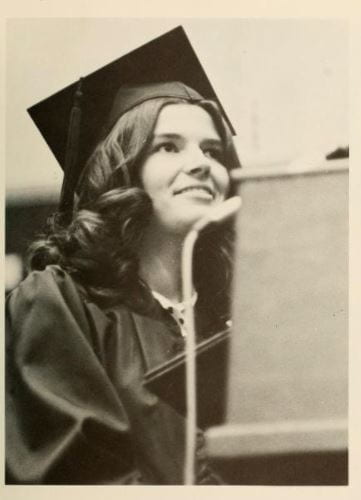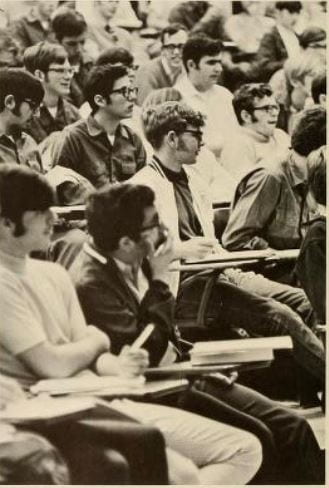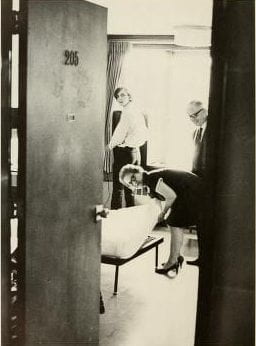Women at WPI
A look into women’s history at WPI between the years of 1965 and 1980
…
by Maylee Gagnon,
Grace Gately and Bryan Lima

WPI first admitted women to the university in 1968. After “lukewarm attitudes and rejecting the idea the year prior, trustees approved the enrollment of female students “on a commuter basis, in degree courses” (Trustee Meeting Minutes, 1968). Once on campus, many female students faced prejudice, discouragement and a lack of facilities. This IQP research looks at WPI’s campus culture from 1965-1980 and illuminates the experience of female students on campus. It incorporates interviews with WPI alumni, faculty and staff as well as a review of many mechanisms of discrimination that women faced. By exploring different areas of discrimination and exclusion, we hope that future forms of bias and inequity can be avoided.

Sexists Views

Pictured: female student graduating in 1974
“Maybe this will show you that women do not belong at engineering school. You just go home and find a nice husband and raise a family”
Sexist beliefs and attitudes of faculty, peers and family contributed to the exclusion of female students at WPI. During their time on campus, many female students faced discrimination from WPI faculty and peers. Some professors would clearly state that women did not belong in engineering because they thought women would not be able to handle the work. Sexist attitudes towards women came from peers as well. Many female alumni reported feeling resentment from their peers and being ostracized. Some female alumni reported being told that women should not pursue an education. Even their own family members told them that women were supposed to stay home and have babies and were not expected to have successful careers.
A novelty on campus

The years following the acceptance of women there were very few female students on campus, which contributed to a lack of a sense of belonging. In 1978, a decade over allowing women, the incoming class included 91 women in a class of over 500 (Landry, 2015). Most lectures contained only one or two female students and many women felt like they “stuck out” amidst the predominantly male student body.
“They would watch to see where the girl would sit. And when you sat down, there was a ring of empty desk all around the girl.”
Women were treated as a curiosity and, in some cases, women felt excessive attention because people tried to be overly accommodating. In an interview with the university yearbook The Peddler, Lesley Small said she “felt very, very conspicuous and out place” (Worcester Polytechnic Institute, 1971, p.180).

Inadequate facilities
WPI had not prepared adequate facilities or accommodations such as restrooms or dormitories for female students after admitting them to campus. This lack of unpreparedness served as a key mechanism of discrimination against women students at WPI.
The first two undergraduate women admitted to WPI were commuters because WPI did not have housing for female students at the time. As commuters, these pioneering women would spend most of their time in the library because it had a women’s restroom. Other women’s restrooms around campus were locked single-person restrooms reserved for administrative assistants and secretaries who were hesitant to let students use them, so female students would often have to plan their day around restroom use. Social space for women was also lacking. For instance, in 1975 the Society of Women Engineers requested a Women’s Center on campus, but little to no progress on that idea was ever made.
“The men’s room had a gang shower, and urinals, and they just left it like that. And that was our ladies’ room”

Sources of Support
Support for female students came from a variety of places, including administrators and faculty, campus organizations, and from other women. This support played a key role in women’s hard-won success at the university and counteracted some of the discrimination they faced.
“Professor Wagner was a very special person to that little chemical engineering niche, and especially the women of chemical engineering. He was wonderful”
The untold stories
“I can’t blame the college, it was society at the time. You knew women were not considered equal”
Meet the Authors

Maylee Gagnon
It has been intriguing to reflect on the challenges women have faced at WPI and more broadly in STEM fields, and it’s exciting to see how many changes and how much progress has been made. This also make me more thankful for having fairly limited encounters with discrimination as a female studying STEM, and that I have found a welcoming community at WPI.
This research led me to consider what areas still need improvement. For instance, as computer science major, the department has few female professors. I also remember my first year sitting in the Accelerated Intro class and realizing there were many more male peers than females ones in that class.
This project was meant as a lens into discrimination. There were topics not included here and areas not covered such as more fluid view of gender. There are still challenges women face in STEM today. There are also many other forms of discrimination to overcome. I hope you take the time to reflect on the challenges described on this page and to consider what other forms of discrimination surround us.

Bryan Lima
It has been exciting and insightful to hear about the different experiences and challenges women have faced throughout their history at WPI and within the STEM field. Our team had to handle contradicting stories and complex responses in order to piece together this representation of WPI’s atmosphere at the time. It’s surprising to compare what WPI’s campus atmosphere is like today in comparison to the time period we researched.
Throughout the course of our project work, I realized how vital it is that WPI’s blemished history is brought to light and reflected upon. I hope our project serves as a template for other groups to explore different areas of discrimination and exclusion, and I hope that future forms of discrimination and exclusion can be avoided.

Grace Gately
I had no hesitations coming to WPI as a woman in engineering. I always knew that engineering was, and still is, a male-dominated field, but I never saw that as an obstacle. This project really brought to light some of the challenges that the first women at this school had to go through and how they overcame them. I was amazed at how little this topic of WPI’s part has been explored, given the school’s progress in almost having an evenly split gender ratio.
One of my favorite parts about this project was being able to connect and hear from women of WPI. I am hopeful that more research will be done to document the experiences of other students at WPI who have been excluded not only in the past, but also in the present. There is still a lot to learn about that type of school WPI once was.
